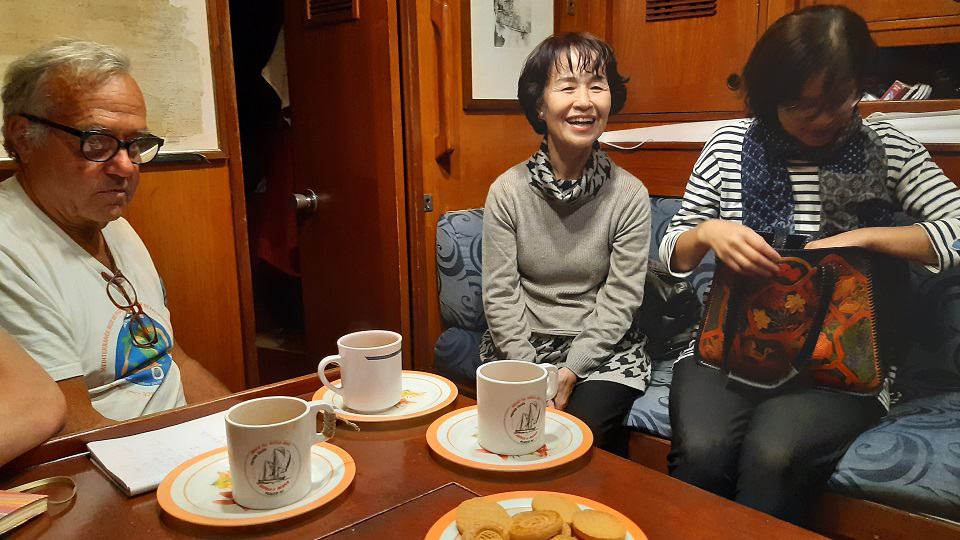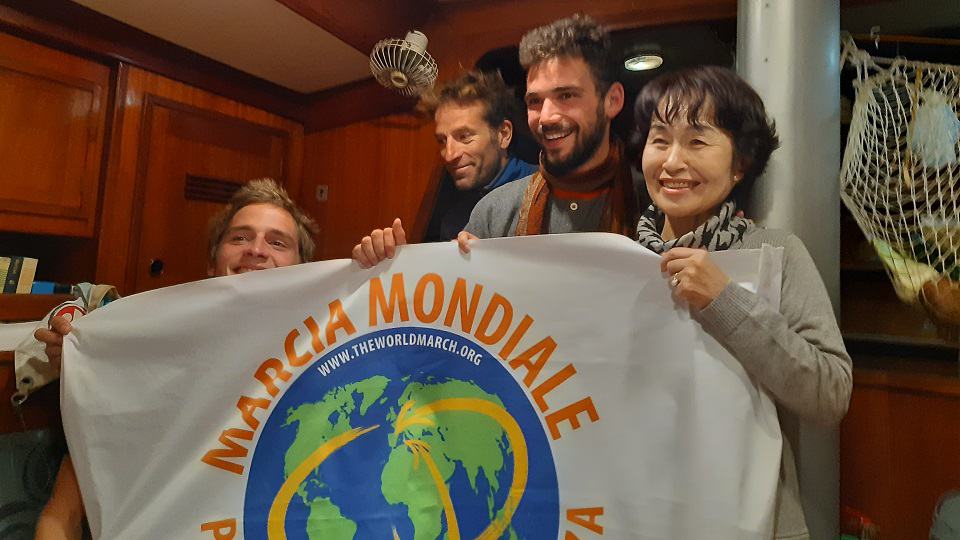November 3 - Inma is irresistible. She has many years of pacifist militancy behind her and she arrived in the Bamboo full of energy and smiles.
We planned the stage of Barcelona and meanwhile we talked about what is happening in the city. The Catalan capital is crossed every day by
manifestations: the condemnation of the independent political leaders had the effect of polarizing and the political clash ended in a dead end.
The feeling is that nobody knows how to get out of it. Barcelona at this time is not one, but it is two cities: that of the Catalans later, and that of the tourists who photograph the manifestations and the Sagrada Familia with the same curiosity.
Two cities that touch but do not touch each other. It almost seems that for tourists the events are nothing more than a picturesque spectacle.
This says a lot about the general habituation to the conflict. Not so for those who live in this city and feel deeply the laceration that this opposition is causing.
We organize ourselves to welcome on the Nariko Sakashita boat, a Hibakusha
This is also discussed on board the Bamboo as we organize to welcome Nariko Sakashita, a Hibakusha, a survivor of the Hiroshima nuclear bomb.
Nariko arrives at two in the afternoon with Masumi, her interpreter. We wait for an old woman and for half an hour we wander in search of a ladder to get on board.
When he arrives, he leaves us speechless: a lady of 77 years who moves with the agility of a girl. You get on board practically without help.
When the bomb exploded in Hiroshima, Nariko was two years old. His whole life was marked by the atomic bomb.
We sit in a square, around the table where we eat and work. There is silence and wait.
Nariko begins to speak: «Arigato…». Thank you, is the first word from her. He thanks us for the meeting and for listening to her.
His voice is calm, the expression is soft, there is no anger in his words, but there is a granite determination: to bear witness.
The oldest of the crew remember the Cold War years
The oldest of the crew remember the years of the Cold War, the long pacifist marches against nuclear weapons.
The youngest know little, even the story of the end of World War II and the bombs dropped on Hiroshima and Nagasaki is a distant event for them. However, only seven decades have passed.
“I was only two years old when the bomb exploded. I remember that my mother is washing clothes. Then something made me fly," says Nariko.
The other memories he has of that day are those he has rebuilt over the years through the stories of his mother and other family members.
Nariko's family lived a kilometer and a half from the point of impact of the bomb. His father was at war in the Philippines, and his mother and two young children, Nariko and his brother, lived in Hiroshima.
The explosion surprised them in the house: a flash, then the darkness and immediately after a violent wind that destroyed the house.
Nariko and her brother are injured, the mother faints and when she recovers
Nariko and her brother are injured, the mother faints and when she regains consciousness she grabs the children and runs away. His whole life will carry in his heart the guilt of not helping his neighbor who asked for help buried under the rubble.
“My mother told me about that voice that asked for help. She couldn't do anything for her friend and neighbor
He had to save his children. She had to choose and this made her feel guilty all her life », says Nariko.
With the children, the woman runs out into the street, not knowing where to go. Hell is in the streets: dead people, pieces of shattered bodies, people who walk unconsciously with their bodies in living flesh from burns.
It's hot and everyone is thirsty and runs to the river. Corpses of humans and animals float in the water.
A black rain begins to fall, like pieces of coal. It is radioactive rain. But nobody knows.
The mother puts her children under a canopy to protect them from what falls from the sky. For three days the city burns.
Hiroshima residents believed they were hit by a powerful bomb
No one knows what is happening, the inhabitants of Hiroshima simply think they have been hit by a powerful new bomb.
And it is at this moment that Nariko's memories become direct: «I was twelve years old and, like all the inhabitants of Hiroshima, I thought I was different.
The survivors, affected by radiation, got sick, malformed children were born, there was misery, devastation, and we were discriminated against because others considered us ghosts, different. At twelve I decided I would never get married.
It is not easy to understand what they experienced in Hiroshima after the bomb.
One thing is clear: the inhabitants knew nothing about the effects of radiation and did not understand what was happening; diseases, deformations had no explanation.
And it was not by chance. Historians have documented a deliberate and radical censorship of the effects of the atomic bomb, a censorship that lasted at least ten years.
It should not have been known that these two bombs dropped on Hiroshima and Nagasaki with the motivation to end World War II and convince Japan to surrender would have an effect on future generations.
The war for the people of Hiroshima and Nagasaki is not over yet.
Nariko keeps counting. She talks about how she decided to witness it alive: “My mother didn't want me to talk about it. She feared that they would mark me and discriminate against me
It is better to shut up and move on. When I met what my husband was going to be, also from Hiroshima, something changed.
My father-in-law said that we had to tell, that we had to explain our experience to the world so that it would not happen again. So I decided to travel
around the world and tell it”.
He tells us when he met the son of the pilot of Enola Gay, the bomber who threw the bomb
He tells us when he was in a school in the United States and had to deal with the skepticism and coldness of some boys who did not want to hear
his words, and when he met the son of the pilot of Enola Gay, the bomber who threw the bomb.
Almost two hours have passed and despite the laborious translation, from Japanese to Spanish and from Spanish to Italian, there was no time for distraction.

When it is time for a break, one of the crew gently asks Nariko:
"Would you like some tea?" There are those who cannot contain a sob.
On board the Bamboo is all a bit Spartan, the water for tea is usually boiled in the large pot, the same in which we cook the pasta, then we throw the bags and serve everything with a ladle in simple cups.
We have to admit that our tea ceremony leaves much to be desired.
We have to admit that our tea ceremony leaves much to be desired. Imagine what our Japanese guest will think.
We scanned her waiting for a reaction. Take the cup, show a bright smile, bow your head and say: Arigato.
Now it's dark Nariko and Masumi must return. We hug, we will meet in the Peace Boat in 48 hours.
Shortly after René, Inma, Magda and Pepe get on board, the idea is to have a moment of reflection together but we end up telling our stories
while we eat the cookies they brought us.
And let's make another tea. It is good to be at the Bamboo with new friends and it is good to think that there is a network of people who have been stubbornly persevering in their work for nuclear disarmament for years.
The new challenge for nuclear disarmament is to reach the 50 ratifications of the TPAN
“We were young when we started, now we have white hair. We have carried out so many campaigns, suffered many defeats and some victories such as ICAN's international campaign for the abolition of nuclear weapons, Nobel Peace Prize 2017", says Inma
The new challenge for nuclear disarmament is to reach the 50 ratifications of the TPAN, the international treaty for the prohibition of nuclear weapons.
This is the first objective of the March. We should all be concerned that there are 15.000 nuclear devices in the world, of which 2.000 is operational and ready to be used in a minute; In Europe there are 200 nuclear devices, most of which are in the Mediterranean.
However, the focus on nuclear energy seems to have reached the end of the priority list of States and public opinion, although, unlike the small Nariko and the Japanese of 1945, we know exactly what the consequences of a Atomic bomb: a frightful war that lasts for generations.


2 comments on “Logbook, November 3”